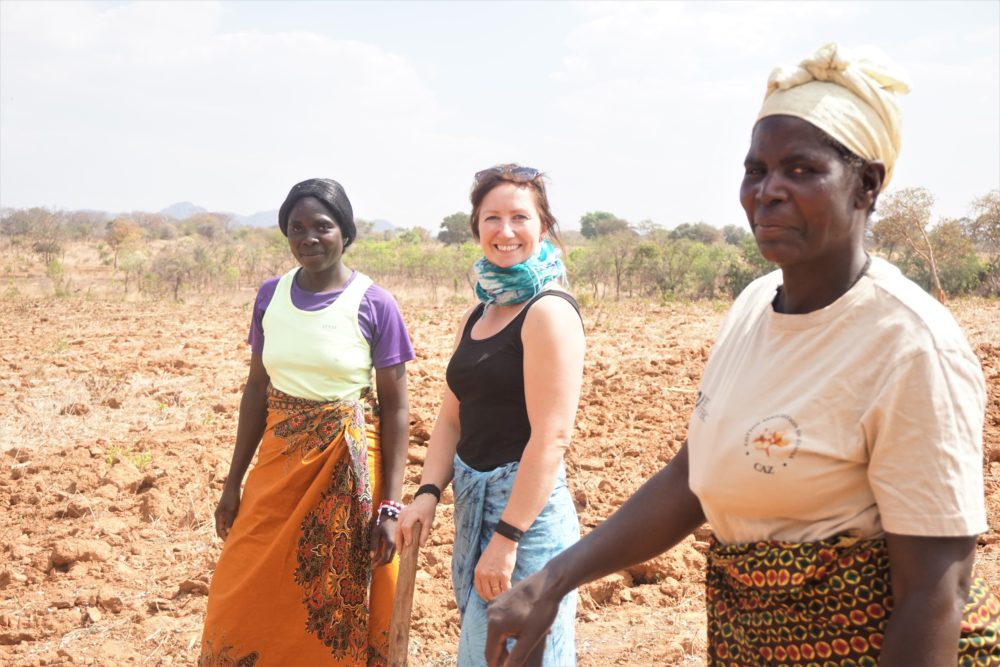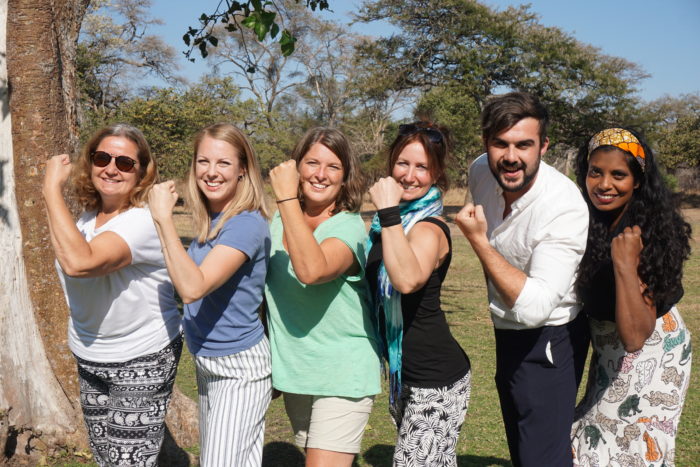Challenge Poverty: We Effect’s Swedish member organisations in Zambia
Date
September 6, 2019
Elin Bergström, farmer and representative from LRF Sundsvall with Florida Sikufa and Anna Silubunga, farmers from Mabele
Between 18-25 August, representatives from Coop, HSB, KfS, LRF, OK and Riksbyggen traveled with We Effect to Zambia to take part in We Effect’s work in the field.
The trip is part of We Effect’s project “Challenge Poverty”. The purpose of the project is to increase the knowledge of and commitment to the issues We Effect is working on, so that we together can challenge poverty and contribute to the global sustainable development goals.
– To be able to fight poverty we all have to contribute. Our member organisations are very important in our work, both through their expertise and also through their network, says Anna Tibblin, We Effect Secretary General.

For five days, the participants met with We Effect staff at the regional and country offices in Zambia, as well as with We Effect’s local partner organisations Cotton Association of Zambia and Civic Forum on Housing and Habitat in Zambia.
The trip followed the project’s three themes of sustainable agriculture, adequate housing and financial services, and the participants visited several projects and also participated in activities on the same themes.
Sustainable agriculture in a country hit by climate change
Zambia is severely affected by climate change and the rain comes irregularly or not at all. At the moment, the country is facing another potential drought and food crisis. The southern parts of the country are the worst affected. Right now, 1.7 million Zambians have difficulty getting food for the day. The situation is expected to get worse over the next six months.
Through study circles in Mabele, Mumbwa, the visiting group learned about sustainable agriculture methods, such as land preparation while preserving the moisture in the soil and saving water.
– People here have learned how to farm in a sustainable way in order to adapt to climate change. And now I have even greater respect for various forms of agriculture and food production, says Elin Bergström, from LRF.
– People also take such good care of their resources and there is no food waste. You only cook the food you need and that is a lesson for us in Sweden, says Åsa Sandberg, Coop.
Together with We Effect’s partner organisation Cotton Association of Zambia, the participants also visited the country’s first farmer-owned cotton ginnery and learned about how the cooperative members get control over, and a higher price for, the cotton.
They also learned more about the initiative “From farm to fabric”, where the value chain is followed and where women receive training in spinning and weaving and being able to sell the final product – the fabric. In Zambia, women do most of the work in the field, while men are usually in charge of the sales. Through the initiative, in combination with savings and loan groups, women are given the opportunity to take control of their own finances.
– It is great to see how women can contribute with an income to the family and also their incredible enterprise spirit, says Anna Papatziamos, from OK.
– The saving and loan group is really cooperation in its purest form, continues Lena Aronsson from KfS.
Adequate housing a human right
In Mahopo, on the outskirts of Lusaka, We Effect’s partner organisation Civic Forum on Housing and Habitat has worked to secure land for people to build houses on. Through housing cooperatives, the members work together on both house building and on creating good living conditions.
– I have seen such joy in being able to improve the living situation and being able to provide adequate housing for yourself and your children, says Anna Bengtsson from HSB.
The Swedish group got to follow the construction process and participating in making building blocks themselves.
– I am impressed by the people I have met, who live in harsh conditions, and at the same time performing really hard work. Both in the field and when building houses, says Muhamed Mandzic, from Riksbyggen.
During the rest of the year, the group will share their experiences within their organisations.
– It is impossible to shy away from the fact that many of the people we have met during this visit are the ones that have the least impact on the climate, but at the same time it is the same people who are most affected by climate change, says Anna Bengtsson, HSB.